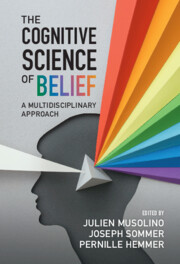Book contents
- The Cognitive Science of Belief
- The Cognitive Science of Belief
- Copyright page
- Contents
- Figures and Tables
- Contributors
- Chapter 1 Introduction
- Part I Understanding Belief
- Philosophical and Linguistic Approaches to Beliefs
- Models of Optimal Beliefs
- Implicit vs Explicit Beliefs
- Chapter 7 Intuitive and Reflective Beliefs
- Chapter 8 Intuitive and Reflective Beliefs in a Modern World
- Evolutionary Psychology of Beliefs
- Part II Domains of Beliefs
- Part III Variation in Beliefs
- Index
- References
Chapter 8 - Intuitive and Reflective Beliefs in a Modern World
from Implicit vs Explicit Beliefs
Published online by Cambridge University Press: 03 November 2022
- The Cognitive Science of Belief
- The Cognitive Science of Belief
- Copyright page
- Contents
- Figures and Tables
- Contributors
- Chapter 1 Introduction
- Part I Understanding Belief
- Philosophical and Linguistic Approaches to Beliefs
- Models of Optimal Beliefs
- Implicit vs Explicit Beliefs
- Chapter 7 Intuitive and Reflective Beliefs
- Chapter 8 Intuitive and Reflective Beliefs in a Modern World
- Evolutionary Psychology of Beliefs
- Part II Domains of Beliefs
- Part III Variation in Beliefs
- Index
- References
Summary
Human beings form beliefs about the way the world works according to the information that is available to them, their processing ability, and their existing knowledge. However, in such an information-rich world, they sometimes trust their intuitive beliefs rather than their reflective ones. Intuitive beliefs tend to have a bad press in our modern world, as they are often regarded as suboptimal and even erroneous. In the present chapter, we aim to restore their reputation. First, we provide an overview of the two types of beliefs, in the light of dual-process theories whereby people can engage in either fast, almost automatic thinking processes, or slower, more deliberative ones. We then identify contexts in which intuitive beliefs provide compelling cues for daily human activities and sometimes outperform reflective beliefs. Finally, we discuss how intuitive beliefs can even be beneficial for reasoning and learning.
Keywords
- Type
- Chapter
- Information
- The Cognitive Science of BeliefA Multidisciplinary Approach, pp. 172 - 190Publisher: Cambridge University PressPrint publication year: 2022

